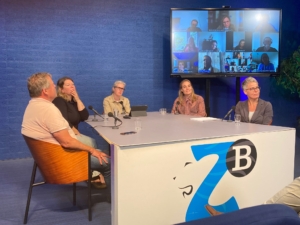big knowledge database update (and all about an unforgettable co-creation session)
So what was it all about, then?
We have reached a couple of milestones with a knowledge database on cancer and work that we have developed and we celebrated this in a special way. It is easiest to explain it all right from the start. In the past few years, we worked on I KNOW HOW together with ZB Bibliotheek van Zeeland, Stichting Westerlicht and HZ University of Applied Sciences. In short, this is a project on cancer and work and how these two affect you.
Development knowledge database in co-creation
Within I KNOW HOW we instigated a project in which we developed a knowledge database in which knowledge and experience is gathered from all kinds of different people who all have (had) to deal with cancer: people who have cancer, their family, colleagues, employers, job coaches, health and safety officers, HR managers, company doctors, oncologists, oncology nurses and many others. This great variety of people shared a lot with us in guided conversations and during co-creation sessions. We showed them intermediate versions of the knowledge database as well, so they could give feedback. All results of this process are now gathered in a wiki knowledge database which is ready for the pilot phase. The contents of the knowledge database are already okay – the technology behind it all and making all the knowledge accessible will still take some work and that is what we will be working on for the time to come.
Live co-creation with all focus groups present
We celebrated reaching the pilot phase by having one of those co-creation sessions in public for the first time. Before the break, we told all about the project – after the break, we had a session the audience could listen to ánd participate in. It was, in all respects, an unforgettable day due to how well the session went, how everyone participated – the people who were digitally present as well – and how much room there was to share stories. It was the first time we had a ‘mixed’ co-creation session with different focus groups together and it was also great to see how these groups combined, complimented and inspired each other.
You had to be there (so we will make sure that there are going to be more opportunities to be there)
Martien Luteijn who works for Solidarity University – he gives shape to our projects – shared the experience he had in the realisation of the knowledge database. During this process, he got cancer and that brought many new insights in how he helped setting up the tool. The public co-creation session was a day of many new insights for him as well, by the way. It was the first co-creation session he attended and weeks later he is still impressed by the stories that came forward and the effect they had. “It was truly great to see that people recognise themselves in the knowledge database’s contents and to see them realise: ‘I can make a valid and vital contribution to all this’. So, it worked on every level and I think it is something we will be doing more often. In this article we share how the story of how the knowledge database works and how special that is, but when you actually see how people who were present at the co-creation session were affected… They will never ever forget that experience.”

*We use the word knowledge database here, but that does not completely express what it is. It is a knowledge database, but at the same time it is a roadmap/tool/wiki. A lot of knowledge was gathered in the I KNOW HOW project, but a knowledge database is just too passive a term.
